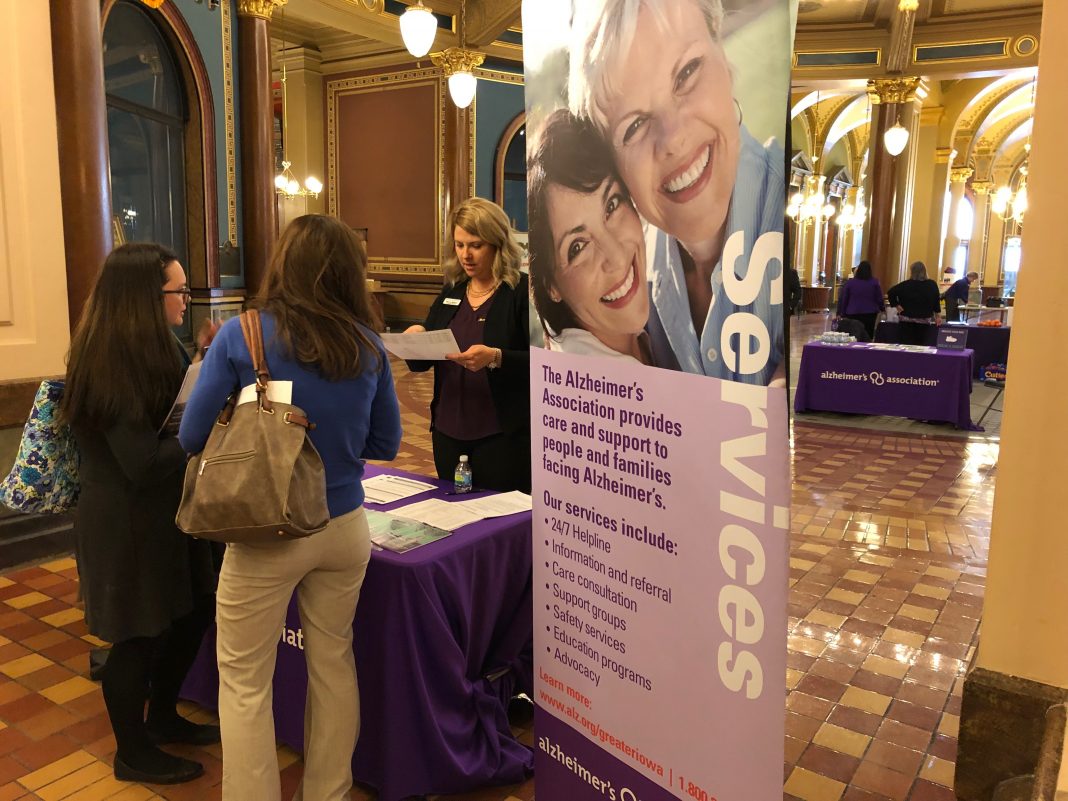Tuesday was advocacy day at the Capitol for the Alzheimer’s Association. The group set up shop in the Capitol rotunda to increase awareness of the disease.
“We are the largest organization to raise awareness, money for research and advocacy to eliminate Alzheimer’s disease,” said communications director Courtney Maxwell Greene. “Currently there are 64,000 Iowans with Alzheimer’s and 5.7 million Americans. Every 65 seconds somebody develops Alzheimer’s disease. Alzheimer’s and dementia are a huge problem.
“It’s a public health crisis. It costs billions of dollars every year in terms of care-giving expenses and medical expenses.”
The group was also promoting its 10 Ways to Love Your Brain campaign.
“We have an awareness reception in the Capitol to talk about ways to reduce your risk of dementia,” said public policy director Emily Hockins. “Today we really wanted to highlight four areas. We really want to establish healthy behaviors to help reduce the development of dementia and get people making accommodations that will help them in the long run so that while we wait for a cure or for treatment for Alzheimer’s disease we can take the steps we need to live a healthier life.”
There were stations set up highlighting four of those methods.
*Buddy up promotes social engagement to reduce rates of disability and mortality. It may also reduce the risk for depression. Remaining socially active may support brain health and could potentially delay the onset of dementia.
Tips include visiting with family and friends, engaging with new friends, staying involved in the community, volunteering outside the home, joining a group or club, and attending a support group.
*Break a sweat promotes exercise and physical activity. Studies have shown benefits for those with Mild Cognitive Impairment or Alzheimer’s. Mild-to-moderate physical activity may help delay or slow a decline in thinking skills, reduce stress, possibly help improve symptoms of depression, reduce risk of falls and benefit brain cells by increasing blood and oxygen flow.
Suggestions include yoga, tai chi and stretches, dancing classes, jogging or walking, yard or housework, sports such as tennis, golf, swimming, and strength training.
*Stump yourself encourages to be challenged mentally. Those activities could provide short-term and long-term benefits.
Folks are encouraged to read books and articles, complete challenging puzzles, play games that are strategic in nature, learn new skills or hobbies, join clubs focused on your interest, and engage in formal education.

*Fuel up right focuses on diet. A balanced diet has not been proven as an effective treatment to address symptoms of the disease, but the best current evidence suggests that heart-healthy eating patterns (like the Mediterranean diet) may help protect the brain as well.
Foods promoted are fruits and vegetables (especially berries and leafy greens), nuts, beans and whole grains, lean meats, fish and poultry, and vegetable oils (like olive oil). Behaviors worth practicing include proper portion sizes, getting adequate fluids, avoiding processed and fried foods, and limiting sugars and saturated/trans fats.
The Alzheimer’s Association is lobbying lawmakers to pass the CARE Act, which features four provisions:
1. If a patient chooses to designate a caregiver, it is recorded when the patient is admitted.
2. The caregiver is notified when the patient is to be discharged.
3. The hospital consults the caregiver of the loved ones abilities/limitations.
4. The hospital instructs the caregiver of the patient’s needs at home with explanation of the tasks to be performed.
In addition, the group is hopeful Iowa lawmakers will support establishing a Home Modification Assistance Program and appropriate $1 million for it.
“A Home Modification Assistance Program will help low-income Iowans living with a disability caused by age, chronic disease or injury to modify their homes to increase accessibility, safety and to remain independent,” said the group’s legislative agenda statement. “Continuing to live in one’s home promotes emotional wellbeing, independence and maintaining a connection to the community. It is also more cost-effective compared to institutional care.”
Those interested in learning more can visit alz.org. There is also a help line set up to assist 24/7. That number is 1-800-272-3900.
“No matter morning, noon or middle of the night — if you have questions, you have issues, if you have a loved one who may be lost and you’re not sure where to turn, call that number,” Greene said.









